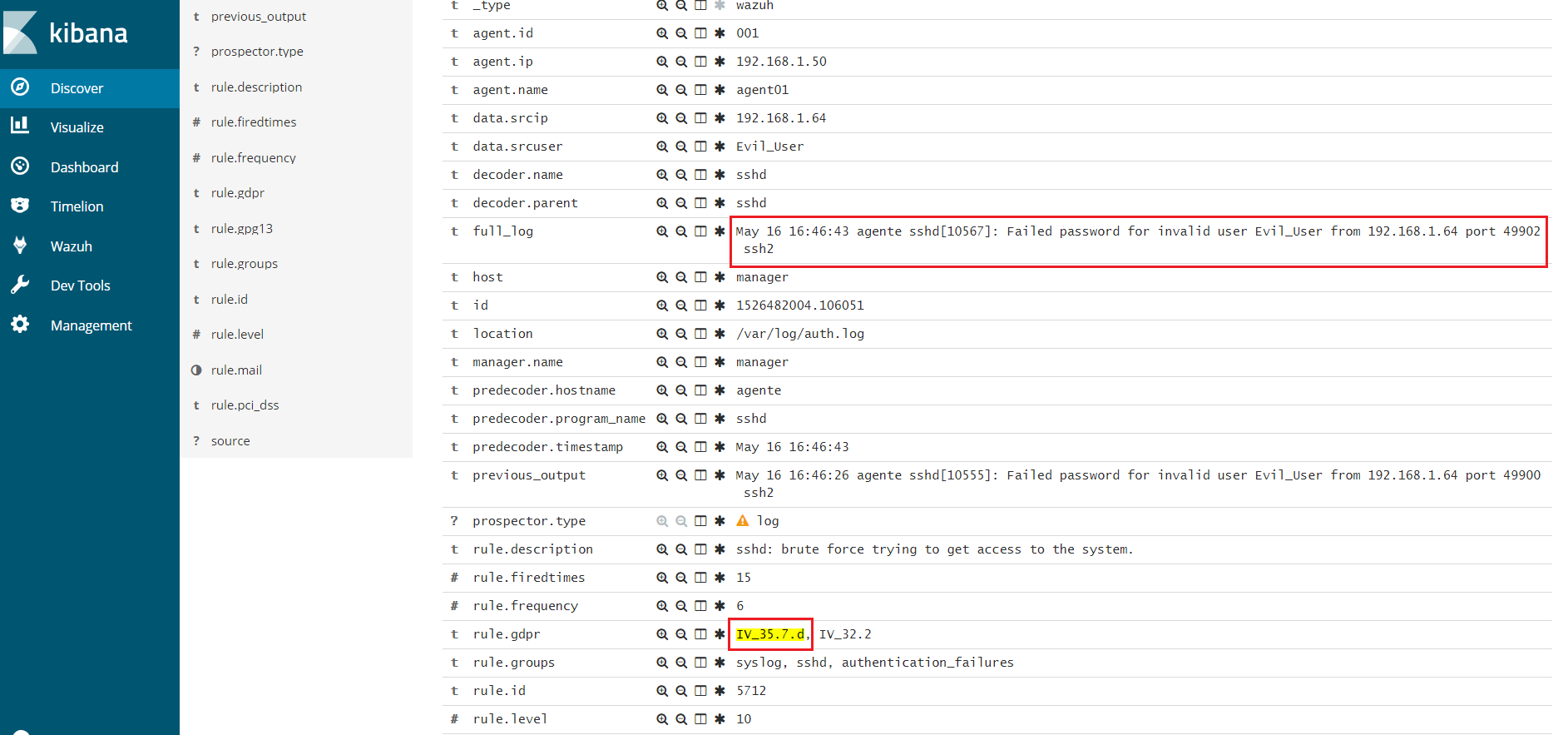GDPR IV, Controller and processor <gdpr_IV>
In this chapter we can find requirements related to management, control and processing of personal data.
Chapter IV, Article 24, Head 2
Article 24 "Responsibility of the controller. Head 2. Where proportionate in relation to processing activities, the measures referred to in paragraph 1 shall include the implementation of appropriate data protection policies by the controller."
It will be necessary to comply with security and data protection policies. Therefore, the entity in charge of processing and storing data must be able to comply with these policies.
Wazuh monitors configuration files to ensure they are compliant with your security policies, standards and/or hardening guides. Agents perform periodic scans to detect applications that are known to be vulnerable, unpatched, or insecurely configured.
Policy monitoring is the process of verifying that all systems conform to a set of predefined rules regarding configuration settings and approved application usage. Wazuh uses three components to perform this task: Rootcheck, OpenSCAP and CIS-CAT.
Use cases
We can use rootcheck to monitor security policies. The first thing to do is to enable the appropriate rootcheck file.
root@agent:/home/agent# cat /var/ossec/etc/ossec.conf | grep system_audit_ssh -B 4 -A 2
<rootkit_files>/var/ossec/etc/shared/rootkit_files.txt</rootkit_files>
<rootkit_trojans>/var/ossec/etc/shared/rootkit_trojans.txt</rootkit_trojans>
<system_audit>/var/ossec/etc/shared/cis_debian_linux_rcl.txt</system_audit>
<system_audit>/var/ossec/etc/shared/system_audit_rcl.txt</system_audit>
<system_audit>/var/ossec/etc/shared/system_audit_ssh.txt</system_audit>
If enabled, the file archives.log stores every log parsed by the Wazuh engine, whether it becomes an alert or not:
root@manager:/home/manager# tail -f /var/ossec/logs/archives/archives.log
2018 May 16 17:14:45 (agent01) 192.168.1.50->rootcheck Ending syscheck scan.
2018 May 16 17:14:58 manager->rootcheck Starting rootcheck scan.
2018 May 16 17:15:06 manager->rootcheck System Audit: SSH Hardening - 3: Root can log in. File: /etc/ssh/sshd_config. Reference: 3 .
2018 May 16 17:15:06 manager->rootcheck System Audit: SSH Hardening - 4: No Public Key authentication {PCI_DSS: 2.2.4}. File: /etc/ssh/sshd_config. Reference: 4 .
2018 May 16 17:15:06 manager->rootcheck System Audit: SSH Hardening - 5: Password Authentication {PCI_DSS: 2.2.4}. File: /etc/ssh/sshd_config. Reference: 5 .
2018 May 16 17:15:06 manager->rootcheck System Audit: SSH Hardening - 6: Empty passwords allowed {PCI_DSS: 2.2.4}. File: /etc/ssh/sshd_config. Reference: 6 .
2018 May 16 17:15:06 manager->rootcheck System Audit: SSH Hardening - 7: Rhost or shost used for authentication {PCI_DSS: 2.2.4}. File: /etc/ssh/sshd_config. Reference: 7 .
2018 May 16 17:15:06 manager->rootcheck System Audit: SSH Hardening - 8: Wrong Grace Time {PCI_DSS: 2.2.4}. File: /etc/ssh/sshd_config. Reference: 8 .
2018 May 16 17:15:06 manager->rootcheck System Audit: SSH Hardening - 9: Wrong Maximum number of authentication attempts {PCI_DSS: 2.2.4}. File: /etc/ssh/sshd_config. Reference: 9 .
Chapter IV, Article 28, Head 3 (c)
Article 28 "Processor. Head 3 (c). Processing by a processor shall be governed by a contract or other legal act under Union or Member State law, that is binding on the processor with regard to the controller and that sets out the subject-matter and duration of the processing, the nature and purpose of the processing, the type of personal data and categories of data subjects and the obligations and rights of the controller. That contract or other legal act shall stipulate, in particular, that the processor: takes all measures required pursuant to Article 32"
Entities must ensure data protection during data processing through technical and organizational measures. While processing data, it is necessary to ensure its protection and integrity in order to avoid any alteration that may be harmful to the individual to whom the information belongs.
By using Syscheck and through technical measures, Wazuh can ensure the protection measures established are met. Use cases ^^^^^^^^^
Wazuh can help to control the security in the processing of data using Syscheck we can see the events that arise, the accesses, who performs them, etc.
** Alert 1526486886.138354: - ossec,syscheck,pci_dss_11.5,gpg13_4.11,gdpr_II_5.1.f,
2018 May 16 18:08:06 (agent01) 192.168.1.50->syscheck
Rule: 550 (level 7) -> 'Integrity checksum changed.'
Integrity checksum changed for: '/root/personal_data/secret_data.txt'
Size changed from '0' to '13'
Old md5sum was: 'd41d8cd98f00b204e9800998ecf8427e'
New md5sum is : '2dc8f4959967624fef8b817e01f0d996'
Old sha1sum was: 'da39a3ee5e6b4b0d3255bfef95601890afd80709'
New sha1sum is : '0f26c2227a2101cffbfc4643f21f3802b4ff0926'
What changed:
0a1
> Data secret
File: /root/personal_data/secret_data.txt
Old size: 0
New size: 13
New permissions: 100644
New user: root (0)
New group: root (0)
Old MD5: d41d8cd98f00b204e9800998ecf8427e
New MD5: 2dc8f4959967624fef8b817e01f0d996
Old SHA1: da39a3ee5e6b4b0d3255bfef95601890afd80709
New SHA1: 0f26c2227a2101cffbfc4643f21f3802b4ff0926
Old date: Wed May 16 18:07:43 2018
New date: Wed May 16 18:08:02 2018
Old inode: 19712
New inode: 19715

Chapter IV, Article 30, Head 1 (g)
Article 30 "Records of processing activities. Head 1 (g). Each controller and, where applicable, the controller's representative, shall maintain a record of processing activities under its responsibility. That record shall contain all of the following information: where possible, a general description of the technical and organisational security measures referred to in Article 32(1)."
It is necessary to keep all processing activities documented, to carry out an inventory of data from beginning to end and an audit, in order to know all the places where personal and sensitive data are located, processed, stored or transmitted.
Wazuh facilitates the development of documentation with a large amount of information about file access and security. It offers the possibility to store all the events that the manager receives in archives logs through Log data collection, in addition to storing alerts in alert logs and being able to use more logs and databases for various purposes, such as possible audits.
Here is an example of Wazuh rules tagged gdpr_IV_30.1.g:
<rule id="516" level="3">
<if_sid>510</if_sid>
<match>^System Audit</match>
<description>System Audit event.</description>
<group>rootcheck,gdpr_IV_30.1.g,</group>
</rule>
Use cases
Wazuh will generate an alert like this.
** Alert 1526470326.10972: - ossec,rootcheck,gdpr_IV_30.1.g,
2018 May 16 13:32:06 (agent01) 192.168.1.50->rootcheck
Rule: 516 (level 3) -> 'System Audit event.'
System Audit: SSH Hardening - 9: Wrong Maximum number of authentication attempts {PCI_DSS: 2.2.4}. File: /etc/ssh/sshd_config. Reference: 9 .
title: SSH Hardening - 9: Wrong Maximum number of authentication attempts
file: /etc/ssh/sshd_config
We can also see the event stored in our log file archives.log, as long as the logall option is activated.
2018 May 16 16:03:55 manager->rootcheck System Audit: SSH Hardening - 9: Wrong Maximum number of authentication attempts {PCI_DSS: 2.2.4}. File: /etc/ssh/sshd_config. Reference: 9 .
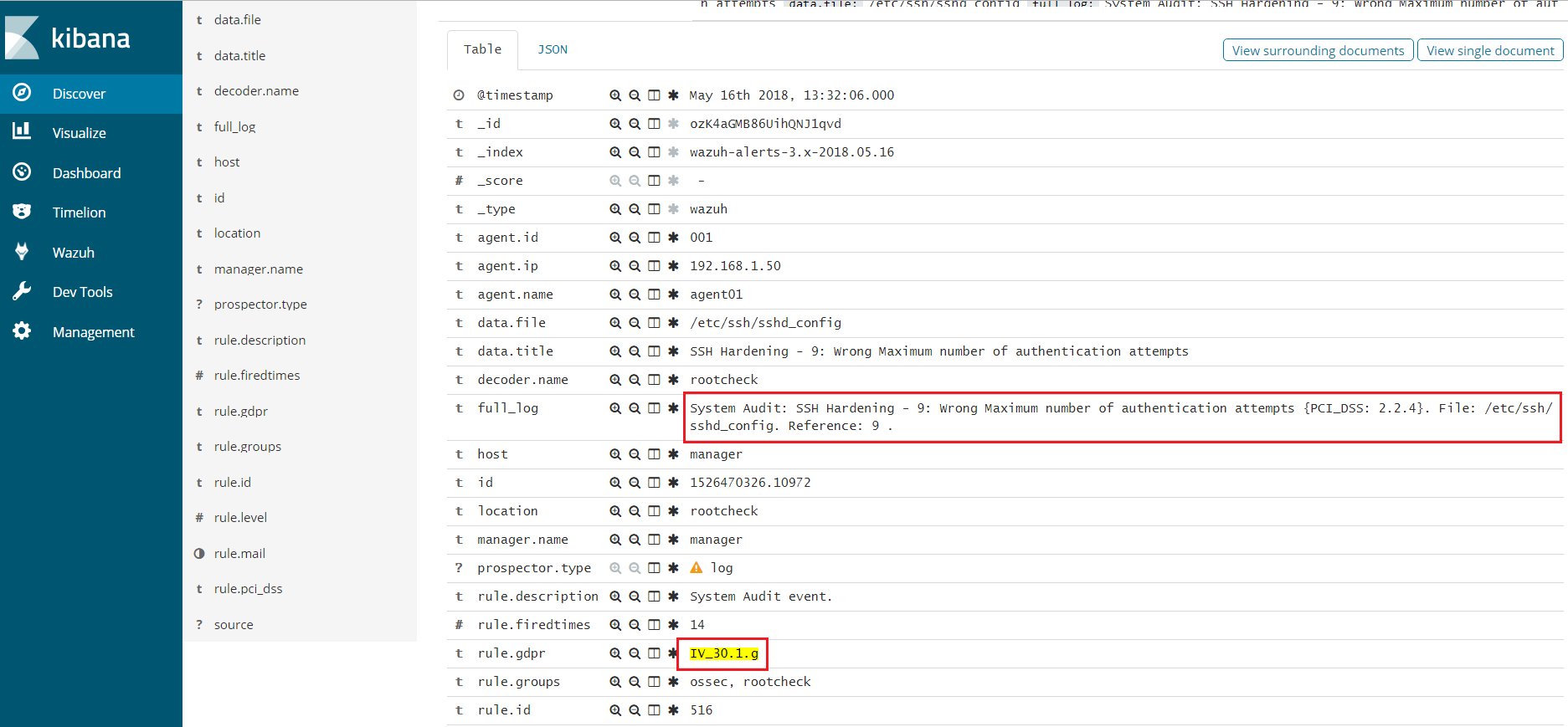
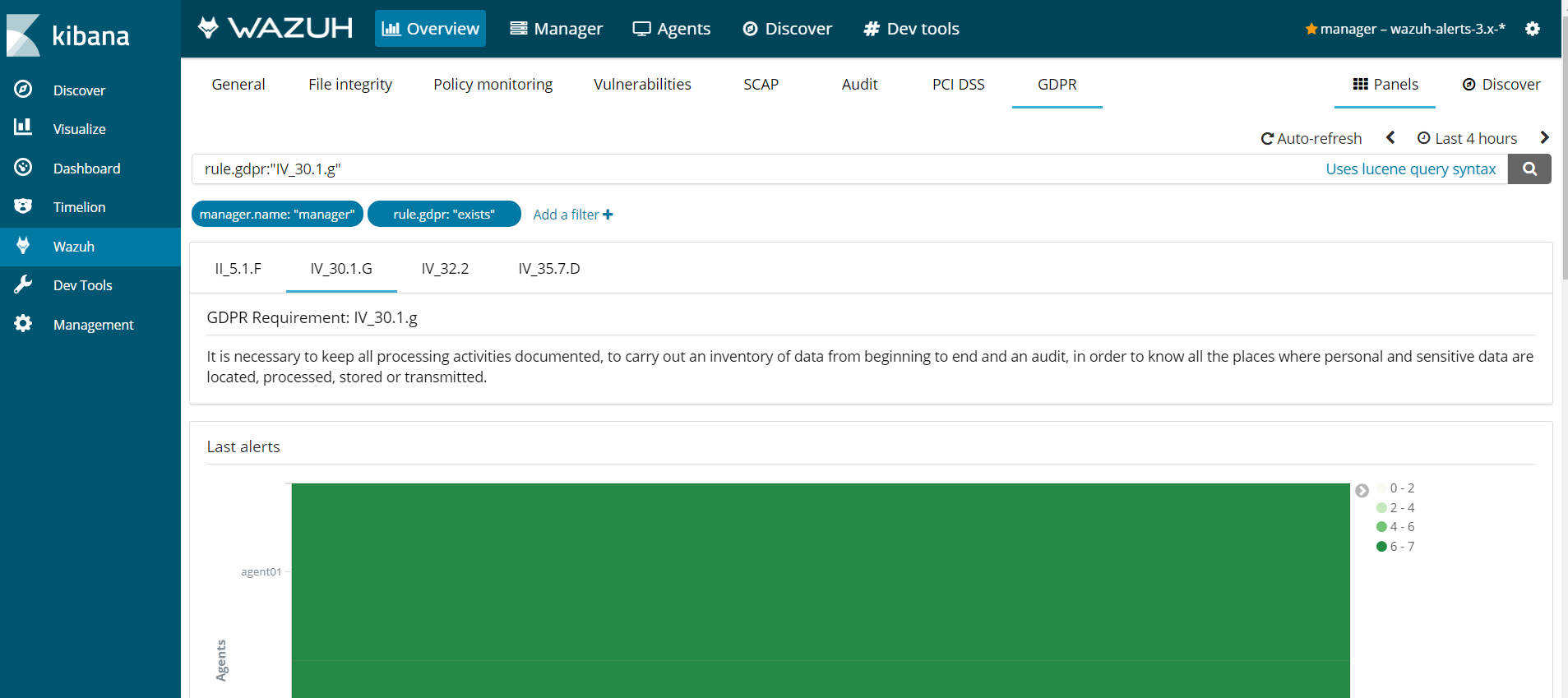
Chapter IV, Article 32, Head 2
Article 32 "Security of processing. Head 2. In assessing the appropriate level of security account shall be taken in particular of the risks that are presented by processing, in particular from accidental or unlawful destruction, loss, alteration, unauthorised disclosure of, or access to personal data transmitted, stored or otherwise processed."
Entities will need account management tools that closely monitor actions taken by standard administrators and users using standard or privileged account credentials. This way, the data protection officer will be able to check who is accessing and processing the data, whether they are authorized to do so and whether they are who they say they are.
Wazuh offers functionalities to monitor access and use of standard or privileged accounts through its multiple monitoring tools.
Here is an example of Wazuh rules tagged gdpr_IV_32.2:
<rule id="5710" level="5">
<if_sid>5700</if_sid>
<match>illegal user|invalid user</match>
<description>sshd: Attempt to login using a non-existent user</description>
<group>invalid_login,authentication_failed,pci_dss_10.2.4,pci_dss_10.2.5,pci_dss_10.6.1,gpg13_7.1,gdpr_IV_35.7.d,gdpr_IV_32.2,</group>
</rule>
Use cases
Wazuh will generate an alert like this.
** Alert 1526481285.44363: - syslog,sshd,invalid_login,authentication_failed,pci_dss_10.2.4,pci_dss_10.2.5,pci_dss_10.6.1,gpg13_7.1,gdpr_IV_35.7.d,gdpr_IV_32.2,
2018 May 16 16:34:45 (agent01) 192.168.1.50->/var/log/auth.log
Rule: 5710 (level 5) -> 'sshd: Attempt to login using a non-existent user'
Src IP: 192.168.1.64
May 16 16:34:44 agent sshd[10485]: Failed password for invalid user Evil_User from 192.168.1.64 port 49806 ssh2
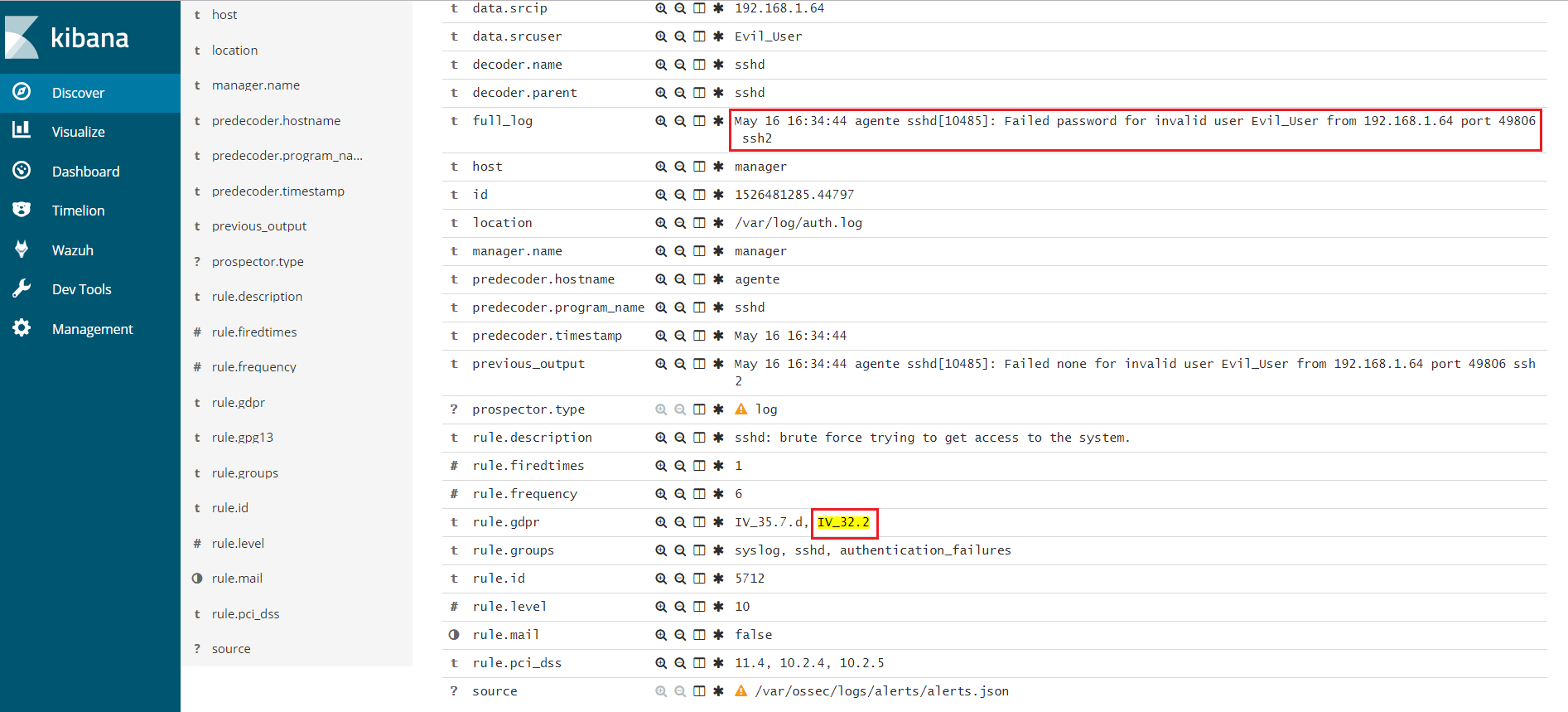
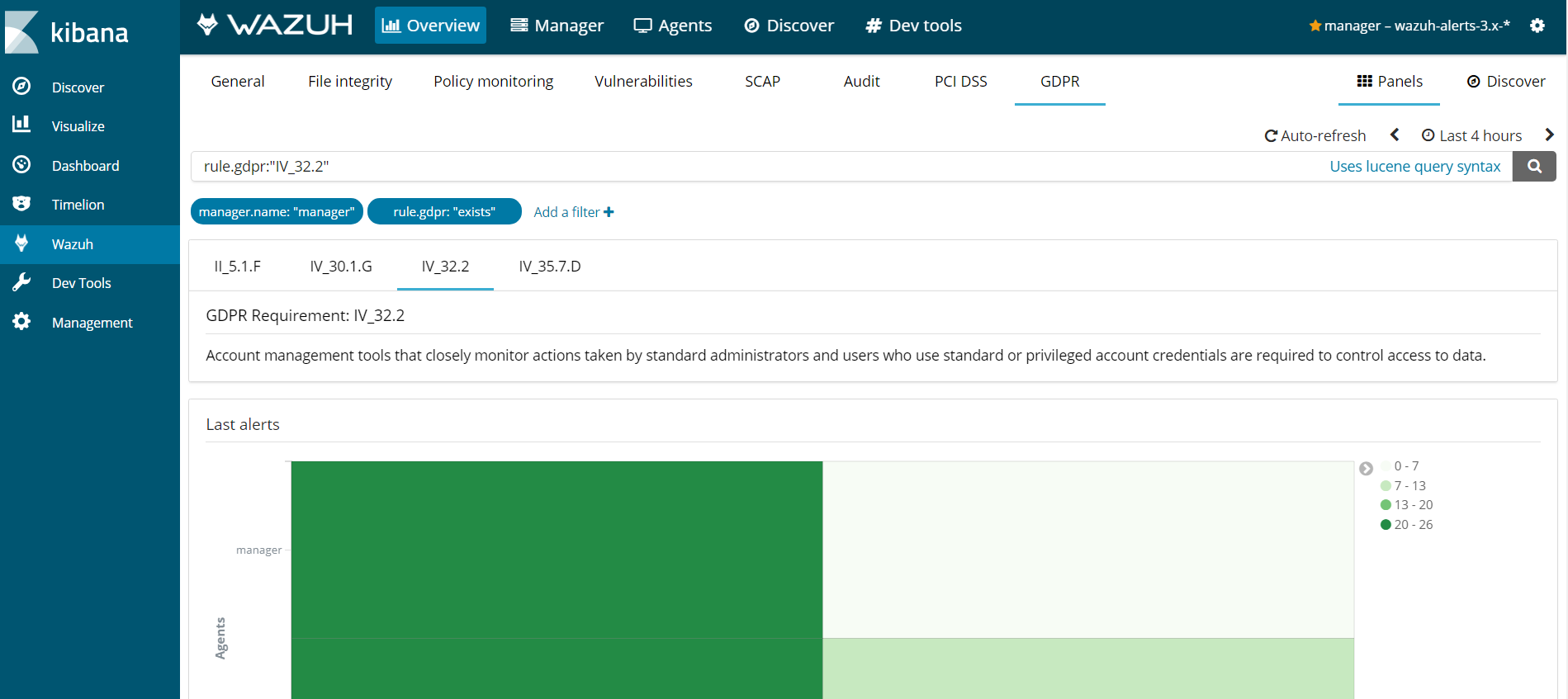
Chapter IV, Article 33
Article 33 "Notification of a personal data breach to the supervisory authority."
It is a required obligation to notify the supervisory authority of a violation of the data within 72 hours.
Wazuh can facilitate this communication, for example, notifying with mail when a specific alert is triggered, or a group of alerts, related to the monitoring of the files that contain personal data. The rules used in event analysis can be configured to send emails to the relevant security officers.
Use cases
A sample email could be:
From: Wazuh <watcher@example.com> 5:03 PM (2 minutes ago)
to: me
-----------------------------
Wazuh Notification.
2017 Mar 08 17:03:05
Received From: localhost->/var/log/secure
Rule: 5503 fired (level 5) -> "PAM: User login failed."
Src IP: 192.168.1.37
Portion of the log(s):
Mar 8 17:03:04 localhost sshd[67231]: pam_unix(sshd:auth): authentication failure; logname= uid=0 euid=0 tty=ssh ruser= rhost=192.168.1.37
uid: 0
euid: 0
tty: ssh
--END OF NOTIFICATION
A basic configuration could be:
<ossec_config>
<global>
<email_notification>yes</email_notification>
<email_to>data_protection_officer@test.com</email_to>
<smtp_server>mail.test.com..</smtp_server>
<email_from>wazuh@test.com</email_from>
</global>
...
</ossec_config>
Chapter IV, Article 35, Head 1
Article 35 "Data protection impact assessment. Head 1. Where a type of processing in particular using new technologies, and taking into account the nature, scope, context and purposes of the processing, is likely to result in a high risk to the rights and freedoms of natural persons, the controller shall, prior to the processing, carry out an assessment of the impact of the envisaged processing operations on the protection of personal data. A single assessment may address a set of similar processing operations that present similar high risks."
Implement appropriate technical measures to safeguard the rights and freedoms of data subjects, informed by an assessment of the risks to these rights and freedoms.
Wazuh has security measures in place to safeguard personal data, as well as the ability to support risk assessment by categorizing Syscheck alerts for certain files. For example, you can add the alert level of an event to support a risk assessment.
Use cases
One possibility is to use rules that, based on their fields, the module that generates them or the specific objective they affect, increase the alert level by supporting risk assessment.
In this case we would have a rule with an alert level 10 because data of a specific subject has changed. But if data belong to critical fields (in this example if the altered data is in /customers/personal_dat), the alert level would rise to 15.
<rule id="105756" level="10">
<if_matched_group>syscheck</if_matched_group>
<description>Changes made in the data of the subjects</description>
</rule>
<rule id="105757" level="15">
<if_sid>105756</if_sid>
<if_matched_group>syscheck</if_matched_group>
<match>/customers/personal_data</match>
<description>Changes to //customers/personal_data - Critical file!</description>
</rule>
Chapter IV, Article 35, Head 7 (d)
Article 35 "Data protection impact assessment. Head 7 (d). The assessment shall contain at least the measures envisaged to address the risks, including safeguards, security measures and mechanisms to ensure the protection of personal data and to demonstrate compliance with this Regulation taking into account the rights and legitimate interests of data subjects and other persons concerned."
Necessary security measures include data breach identification, blocking and forensic investigation capabilities. Anti-malware and anti-ransomware are needed to ensure the integrity, availability, and resilience of data systems, blocking and preventing malware and rescue threats from entering devices.
Also behavioral analysis services that use machine intelligence to identify people who do anomalous things on the network may be required to provide early visibility and alert employees who become corrupt.
In order to meet these security requirements, Wazuh provides solutions such as intrusion and anomaly detection. Agents scan the system looking for malware, rootkits or suspicious anomalies. They can detect hidden files, cloaked processes or unregistered network listeners, as well as inconsistencies in system call responses. In addition, the integration of Wazuh with NIDS is viable.
Anomaly detection refers to the action of finding patterns in the system that do not match the expected behavior. Once malware (e.g., a rootkit) is installed on a system, it modifies the system to hide itself from the user. Although malware uses a variety of techniques to accomplish this, Wazuh uses a broad-spectrum approach to find anomalous patterns that indicate possible intruders. The main component responsible for this task is Rootcheck, however, Syscheck also plays a significant role.
We may be aware of application or system errors, misconfigurations, attempted and/or successful malicious activity, policy violations and a variety of other operational and security issues through Wazuh rules. Using Automated logs analysis Wazuh agents read operating system and application logs, and securely forward them to a central manager for rule-based analysis and storage.
It is worth highlighting the ability to detect vulnerabilities. Now agents are able to natively collect a list of installed applications, sending it periodically to the manager (where it is stored in local sqlite databases, one per agent). In addition, the manager builds a global vulnerabilities database, using public OVAL CVE repositories, using it later to cross correlate this information with agent’s applications inventory data.
Here is an example of Wazuh rules tagged gdpr_IV_32.2:
<rule id="5712" level="10" frequency="6" timeframe="120" ignore="60">
<if_matched_sid>5710</if_matched_sid>
<description>sshd: brute force trying to get access to </description>
<description>the system.</description>
<same_source_ip />
<group>authentication_failures,pci_dss_11.4,pci_dss_10.2.4,pci_dss_10.2.5,gdpr_IV_35.7.d,gdpr_IV_32.2,</group>
</rule>
Use cases
Wazuh will generate an alert like this.
** Alert 1526481936.95480: - syslog,sshd,authentication_failures,pci_dss_11.4,pci_dss_10.2.4,pci_dss_10.2.5,gdpr_IV_35.7.d,gdpr_IV_32.2,
2018 May 16 16:45:36 (agent01) 192.168.1.50->/var/log/auth.log
Rule: 5712 (level 10) -> 'sshd: brute force trying to get access to the system.'
Src IP: 192.168.1.64
May 16 16:45:35 agent sshd[10549]: Failed password for invalid user Evil_User from 192.168.1.64 port 49894 ssh2
May 16 16:45:32 agent sshd[10549]: Invalid user Evil_User from 192.168.1.64 port 49894
May 16 16:45:31 agent sshd[10547]: Failed password for invalid user Evil_User from 192.168.1.64 port 49892 ssh2
May 16 16:45:28 agent sshd[10547]: Failed password for invalid user Evil_User from 192.168.1.64 port 49892 ssh2
May 16 16:45:27 agent sshd[10547]: Failed password for invalid user Evil_User from 192.168.1.64 port 49892 ssh2
May 16 16:45:24 agent sshd[10547]: Invalid user Evil_User from 192.168.1.64 port 49892
May 16 16:44:58 agent sshd[10545]: Failed password for invalid user Evil_User from 192.168.1.64 port 49890 ssh2
May 16 16:44:56 agent sshd[10545]: Failed password for invalid user Evil_User from 192.168.1.64 port 49890 ssh2
